To authenticate your birth certificate, first identify the issuing authority. Gather required documents and fill out the application form. Proceed by paying the fees and submitting your application. Be patient during the processing, and be aware of the timeline. Estimate the authentication cost and look into alternative legalizations. Verify all supporting documents are in order. This meticulous process guarantees the validity of your birth certificate.
Determine Issuing Authority
To determine the issuing authority for authenticating a birth certificate, contact the essential records office or state department responsible for issuing the document at its origin. The birth certificate authentication process hinges on correctly identifying the initial issuer of the birth certificate. This step is pivotal in ensuring the smooth and accurate authentication of the document. By reaching out to the vital records office or state department that handled the birth certificate's issuance, you establish a direct line of communication with the appropriate authority. Understanding the nuances of the issuing authority streamlines the authentication process, preventing delays or errors. Whether it is a local vital records office or a state department, their guidance is instrumental in obtaining the necessary authentication certificate. By adhering to the guidelines provided by the issuing authority, you pave the way for a successful authentication experience, especially crucial for international use of the birth certificate. Be diligent in confirming the correct issuing authority before proceeding with the authentication process.
Gather Required Documents
You must verify that you have the original or a certified copy of your birth certificate with a raised or stamped seal before proceeding with the authentication process. The certified copy should be obtained from the essential records office where your birth was registered. This document will serve as the primary evidence of your birth for authentication purposes. Make sure that the copy is legible, as any unclear or altered copies may lead to delays or rejection of your application.
In addition to the certified copy of your birth certificate, you will need to gather any other supporting documents required for the authentication process. These documents may include a valid form of identification, such as a driver's license or passport. It is important to have all necessary paperwork ready before submitting your documents to the relevant authority for authentication.
Remember that only original or certified copies of documents are accepted for authentication. Make sure you have all the required paperwork in order to facilitate a smooth and efficient authentication process.
Complete Application Form
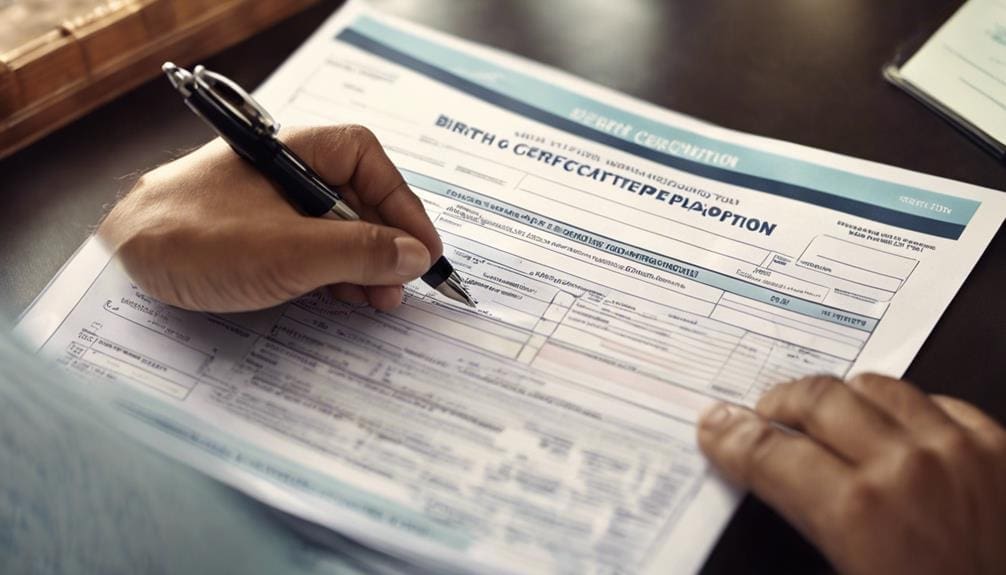
Upon completing the application form for birth certificate authentication, make sure accurate inclusion of all required details and attachments. It is important to guarantee that the information provided on the application form aligns precisely with the details present on the birth certificate. One essential attachment to include is the certified copy of the birth certificate. This certified copy acts as proof of the birth certificate's authenticity and is a necessary requirement for the authentication process.
Before submission, it is advisable to double-check the application form meticulously for any errors or missing information. Following the specific instructions provided by the authentication office is vital to correctly filling out the application form. Failure to include any necessary details or attachments, such as the certified copy of the birth certificate, may result in delays or complications in the authentication process. By adhering to these guidelines and ensuring the completeness of the application form, you pave the way for a smoother authentication process.
Pay Required Fees
You must make sure that the fee for authentication services is $8 per document and is paid using a check or money order payable to the 'U.S. Department of State.' Remember that cash payments are not accepted for authentication fees. When submitting for authentication, include the payment along with the documents and application to guarantee timely processing.
Fee Payment Methods
Accepted payment methods for birth certificate authentication fees include credit card, money order, or cashier's check. It is important to note that cash payments are not accepted for these fees. Some jurisdictions may offer online payment options for birth certificate authentication fees, but verification of accepted methods is vital before submission. To guarantee compliance, reach out to the relevant office or agency for specific details on payment methods for certified birth certificate authentication. By utilizing one of the approved methods—credit card, money order, or cashier's check—you can fulfill the necessary fee requirements for the authentication process. Remember to follow the prescribed payment guidelines to avoid any delays in obtaining your authenticated birth certificate.
Fee Schedule Details
To proceed with the authentication process for your birth certificate, it is crucial to understand the detailed fee schedule in place for the required payment. The Department of State charges a fee of $8 per document for authentication services. If you require expedited service within 2 business days, there is an additional $8 fee. Payment must be made via check or money order payable to the 'U.S. Department of State.' Please note that online payments are not accepted; only checks or money orders will be processed. Keep in mind that fees are subject to change, so it is advisable to verify the current rates before submitting your documents to ensure accurate payment.
Fee Waiver Eligibility
Applicants seeking fee waivers for birth certificate authentication must adhere to the specific eligibility criteria established by the issuing authority. The government agency responsible for issuing the birth certificates sets income thresholds and requires supporting documentation to qualify for fee waivers. Individuals experiencing financial hardship or meeting other qualifying circumstances may be eligible for fee waivers. To request a waiver of the standard fees, proof of eligibility must accompany the authentication request. It is advisable to contact the relevant government agency or office to inquire about the precise requirements and process for obtaining a fee waiver for birth certificate authentication. Meeting the specified criteria is essential to be considered for a fee waiver when applying for birth certificate authentication.
Submit Application
When preparing to submit your application for birth certificate authentication, have you double-checked that the DS-4194 form is completed accurately with all necessary information provided? To guarantee a smooth process, follow these steps:
- Include the Authentication Fee: Remember to enclose the required authentication fee along with the DS-4194 form. Failure to include this may result in delays in the processing of your authenticated birth certificate.
- Provide Certified Copy of Birth Certificate: Make sure to include a certified copy of the birth certificate that requires authentication in the envelope. Without this document, the authentication process cannot proceed.
- Prepare Return Shipping: Enclose a prepaid, self-addressed envelope for the return shipping of your authenticated birth certificate. This step is essential to receive the document securely and promptly.
Await Processing
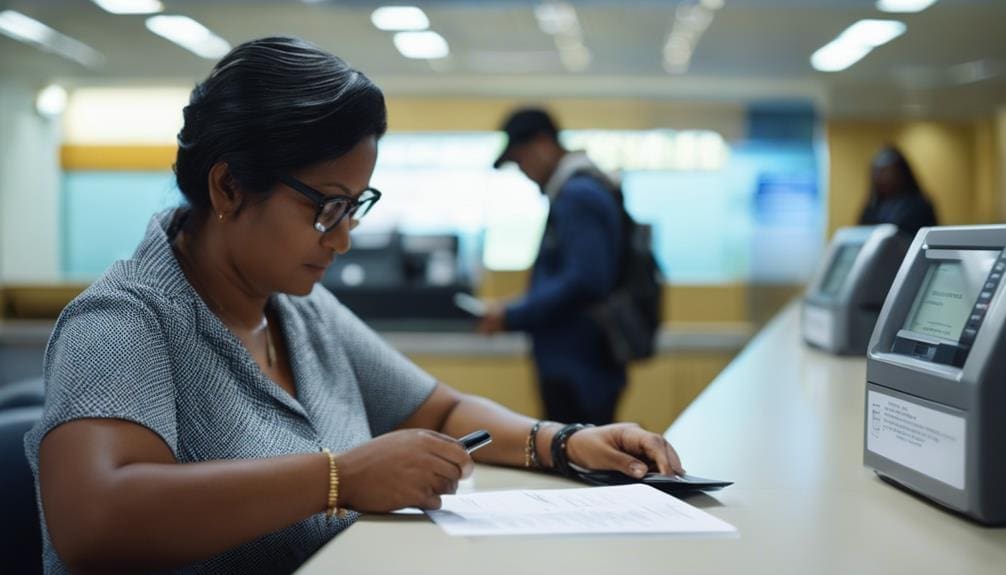
As you wait for the processing of your birth certificate authentication, keep in mind that the duration can vary depending on the method of submission you chose. The processing time typically falls within a range from a few days to a couple of weeks. It is important to be aware of the required documents and any special instructions that might expedite the authentication process.
Processing Time
The processing time for birth certificate authentication is contingent upon the selected method, offering options like standard mail, expedited service, or walk-in appointments. Here are some key points to take into account:
- Standard processing time for birth certificate authentication typically ranges from 12 to 15 business days, excluding mailing times.
- Expedited services can provide quicker processing times, such as within 24 to 48 hours for urgent cases.
- Walk-in appointments at local Office of Authentications allow for faster processing, usually completing within 2 to 3 business days.
Factors like the volume of requests, completeness of documentation, and specific office procedures can influence the actual processing time for birth certificate authentication.
Required Documents
To proceed with the authentication process for your birth certificate, the submission must include the original birth certificate copy, a completed DS-4194 form, a prepaid and self-addressed envelope for document return, and the required authentication fee. It is important to make sure that all these documents are included in your submission to avoid any delays in the authentication process. The DS-4194 form plays a significant role in the authentication process, providing necessary information for verification. Additionally, the prepaid and self-addressed envelope is essential for the return of your authenticated birth certificate. Making sure that the authentication fee is included will enable the processing of your request. By submitting all required documents promptly, you facilitate a smoother authentication process for your birth certificate.
Receive Authentication
Upon completion of the required documentation and submission process, the authentication certificate for your birth certificate is typically issued within approximately 12 days. To guarantee a smooth receipt process, follow these steps:
- Include all Required Documents: Make sure your submission contains the authentication fee, DS-4194 form, a certified copy of your birth certificate, and a prepaid envelope for return shipping.
- Mail to the Designated Office: Send your documents to the Office of Authentications at the U.S. Department of State. This government entity is responsible for verifying and legalizing your document.
- Keep Original Birth Certificate Secure: Remember that while the certified copy is being authenticated, your original birth certificate should stay on file at your local essential records office. This ensures that you have a backup in case it is needed for other purposes within the U.S.
Understand Apostille Purpose
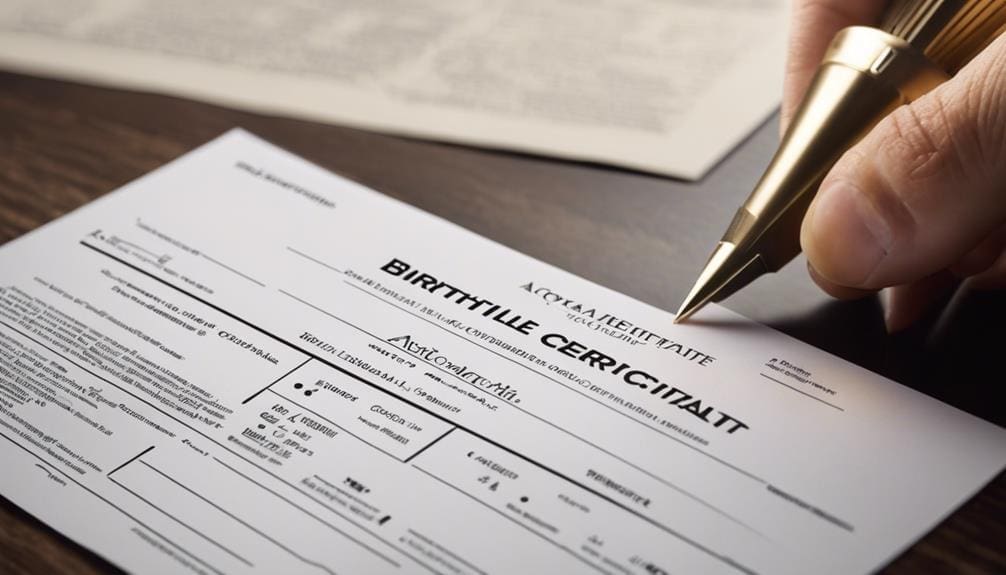
When considering the significance of an apostille, it is important to understand its role in certifying the authenticity of a birth certificate for international transactions. This certification confirms the validity of the signature and seal on the document, ensuring its acceptance in foreign countries. By obtaining an apostille, you are legalizing your birth certificate for international recognition, facilitating its use in various legal contexts abroad.
Apostille Definition
An apostille is a certification that confirms the authenticity and legitimacy of a public document, such as a birth certificate, for international utilization.
- An apostille is a one-page certificate that authenticates the origin of a public document, like a birth certificate, for international use.
- It verifies the signature, seal, and capacity of the issuing authority of the birth certificate.
- Apostilles do not validate the content or information within the birth certificate, only the authenticity of the document itself.
This certification simplifies the process of verifying documents across countries that are part of the 1961 Hague Convention. It guarantees the acceptance and recognition of the birth certificate in foreign countries without the need for further legalization.
Legalization Process
Moving from the apostille definition, understanding the legalization process is crucial for comprehending the purpose an apostille serves in validating a birth certificate for international use. When a state issues an apostille for a birth certificate, it signifies that the signature and seal on the document are authentic. This step does not verify the content of the birth certificate itself but rather guarantees its acceptance in foreign jurisdictions for various legal matters like dual citizenship or marriage abroad. The apostille is needed to ensure that the birth certificate will be recognized by other countries, streamlining the process of international transactions or legal procedures where such documentation is required. By legalizing the birth certificate through an apostille, its validity is acknowledged beyond national borders.
International Recognition
To facilitate international recognition of a birth certificate, acquiring an apostille is imperative to validate the document's authenticity for legal transactions beyond national borders. Here are three key points to understand the significance of an apostille for international recognition:
- An apostille on a birth certificate certifies its validity for international use.
- The apostille serves to verify the signature and seal of the issuing authority on the birth certificate.
- It does not validate the information within the birth certificate but rather confirms its authenticity, making it essential for legal purposes like dual citizenship or marriage abroad.
Obtain Apostille Requirements

To authenticate your birth certificate for international use, it is important to understand and fulfill the required apostille certification process. An apostille is a certification that verifies the validity of your birth certificate for international purposes. It confirms the signature and seal of the issuing authority, ensuring that the document is legitimate and can be recognized in foreign countries. This certification is often necessary for legal matters like obtaining dual citizenship or getting married abroad. By obtaining an apostille for your birth certificate, you guarantee its authenticity and increase the likelihood of it being accepted in other countries. It is essential to follow the specific requirements for obtaining an apostille to ensure that your birth certificate meets the necessary standards for international use. Understanding and adhering to these requirements will help streamline the authentication process and prevent any delays or issues when using your birth certificate abroad.
Apostille Application Process
Commence the apostille application process by identifying the appropriate issuing authority for your birth certificate. The procedure for obtaining an apostille for your birth certificate involves specific steps to guarantee the document's authenticity and validity for international use. Follow these guidelines meticulously:
- Prepare Required Documents: Gather the original copy of your birth certificate along with any additional supporting documents that may be needed for the apostille application process.
- Complete Application Form: Accurately fill out the apostille application form with all the necessary details, making sure that there are no errors or omissions that could delay the processing of your request.
- Submit Application and Payment: Pay the required fees using approved payment methods and keep records of the transaction. Submit the completed application form along with the supporting documents to the relevant authority as instructed, and await the processing of your birth certificate apostille.
Verify International Use
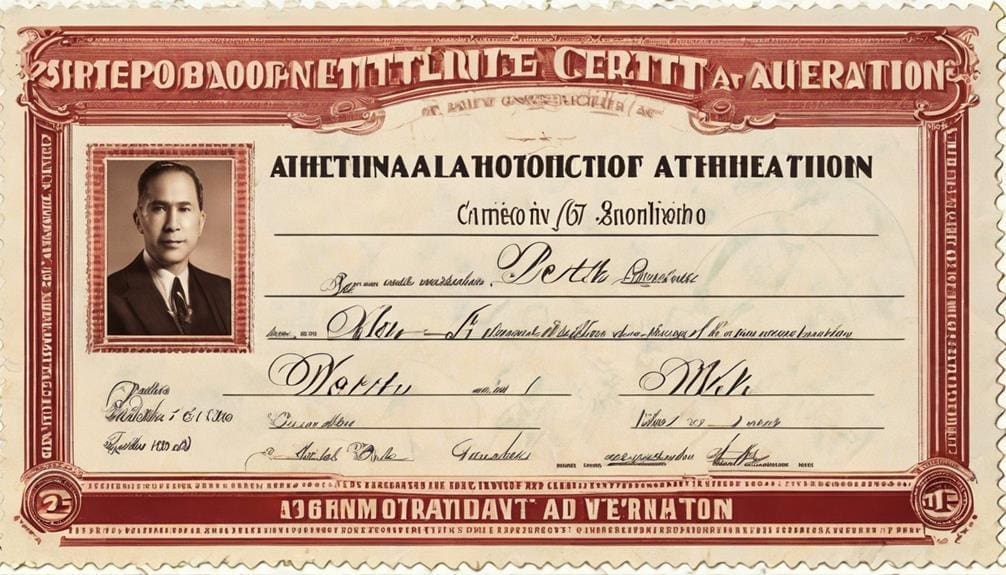
When contemplating the international use of a birth certificate, it is vital to verify its legal recognition abroad. You must confirm if an apostille is necessary for the particular country you plan to utilize the certificate in. Understanding the consulate authentication process is also essential to ensure the document's acceptance and validity overseas.
Legal Recognition Abroad
For legal recognition abroad and to guarantee international use validity, the birth certificate authentication process verifies the signature and seal of the issuing authority. This step is vital to confirm that the document is accepted in foreign countries. To understand the importance of legal recognition abroad, consider the following:
- Dual Citizenship: Proper authentication of your birth certificate may be required when applying for dual citizenship in another country.
- Marriage Abroad: Many countries require authenticated birth certificates when getting married abroad to ensure the legality of the union.
- International Legal Matters: Birth certificate authentication is essential for various international legal matters, such as immigration applications or establishing inheritance rights overseas.
Apostille Requirement Check
To ensure the international validity of your birth certificate, it is important to verify whether the destination country mandates an apostille for its use abroad. The apostille requirement serves as a crucial step in the authentication process, ensuring that your document is recognized and accepted in foreign jurisdictions. Different countries may have specific guidelines regarding apostille procedures, with some necessitating authentication from the U.S. Department of State. It is recommended to consult with the consulate or embassy of the destination country to obtain accurate information on the exact requirements. Understanding and fulfilling the apostille requirement is essential for the legal recognition of your birth certificate internationally, facilitating its acceptance in various official transactions and procedures overseas.
Consulate Authentication Process
The Consulate Authentication Process certifies the international validity of official documents, such as birth certificates, ensuring recognition in foreign jurisdictions through verification of signatures, seals, and official capacity.
- The Secretary of State may be involved in the initial authentication of the document before consulate verification.
- Consulate authentication is important for countries that are not part of the Hague Convention for proper recognition.
- This process is essential for legal matters like marriage abroad or when applying for dual citizenship to guarantee document authenticity and validity overseas.
Consider Processing Time

Consider the varying processing times when seeking authentication for your birth certificate. The processing time for birth certificate authentication can range from 2 to 12 days based on the chosen method. If you opt for a walk-in request at the local Office of Authentications, the processing time typically falls within 2 to 3 days. Urgent appointments for authentication in emergency situations can expedite the process, providing proof of travel within 24 to 48 hours. Conversely, mail-in requests for authentication may take around 12 days to receive the authentication certificate. To track the status of your authentication request, you can utilize the Contact Us form, with an expected response time of about a week. Understanding these processing times will help you plan accordingly and make sure your birth certificate authentication aligns with your timeline requirements.
Estimate Cost of Authentication
When estimating the cost of authenticating your birth certificate, it is important to bear in mind the range of fees that may apply. Here are some key points to keep in mind:
- The cost of authentication for a birth certificate typically falls within the range of $8 to $15 per document. This base fee is standard for most authentication services.
- Additional fees may apply for expedited processing or special services. If you require your documents to be authenticated urgently or if you need specific assistance, be prepared for potential extra charges.
- Some states may have specific pricing structures for authentication services. It is advisable to check with the relevant authority or consulate to confirm the exact costs applicable to your situation. Prices can vary depending on the state and the services required, so it is essential to gather this information beforehand to budget accurately for the authentication process.
Explore Alternative Legalizations
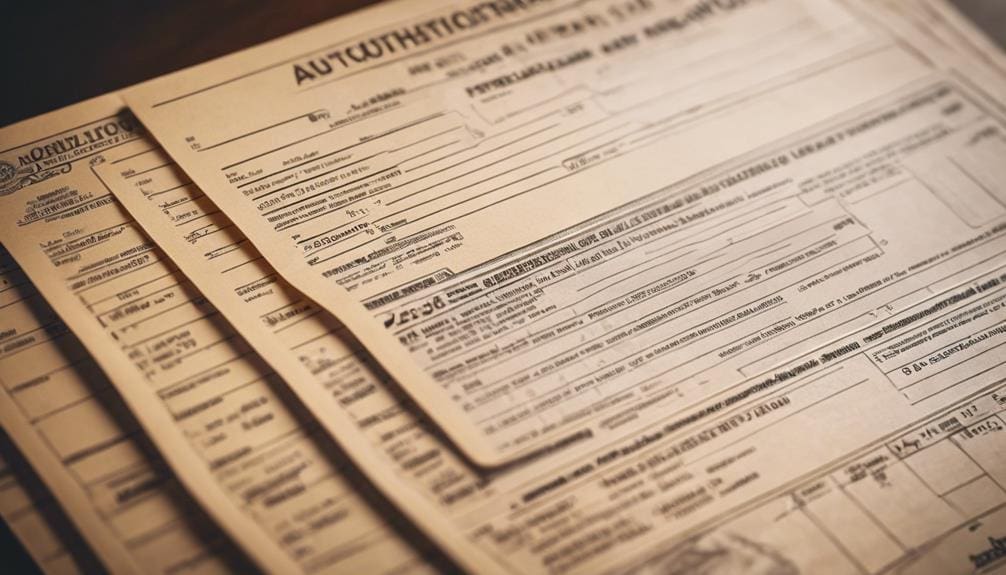
To further broaden your understanding of document authentication, it is important to explore alternative legalizations beyond the standard embassy or consulate processes. Embassy authentication and legalization by the Foreign Ministry are two such alternative methods that may be required for countries that do not accept apostilles for document authentication.
Embassy authentication involves gathering specific documents, completing forms, paying fees, and waiting for processing at the respective embassy or consulate. On the other hand, legalization by the Foreign Ministry necessitates understanding their requirements, preparing documents, filling out forms, paying fees, submitting the application, and awaiting processing.
It is essential to note that each alternative method has its own distinct set of procedures, costs, and processing times. Therefore, it is important to conduct thorough research and adhere to the specific requirements of the country in question when opting for embassy authentication or legalization by the Foreign Ministry.
Check Supporting Documentation
You must make sure that the original or certified copy of the birth certificate is available for authentication purposes. Here are three important items to check when verifying your supporting documentation for the birth certificate authentication process:
- DS-4194 Form: Confirm that the DS-4194 form is completed accurately with all the required information. This form is essential for initiating the authentication process and must be filled out diligently to avoid any delays.
- Authentication Fee: Verify that you have included the authentication fee required for the service. Failure to provide the necessary payment may result in a halt to the authentication process, so it is essential to confirm the fee amount and include it with your application.
- Prepaid, Self-Addressed Envelope: Make sure you have a prepaid, self-addressed envelope included with your documents for the return of the authenticated birth certificate. This ensures a smooth and efficient process for receiving your authenticated certificates back after the authentication is completed.
Frequently Asked Questions
How Do I Authenticate My US Birth Certificate?
To authenticate your US birth certificate, you must follow international requirements. Notarization is an important step in this process. One interesting statistic to note is that over 100 countries are part of the Hague Convention, simplifying the authentication process with apostilles. However, for non-Hague Convention countries, an authentication certificate may be necessary. Make sure you understand and adhere to the specific procedures to authenticate your birth certificate correctly.
How Do You Authenticate Documents?
To authenticate documents, adhere to the verification process and legal requirements. Start by notarizing at the county level, followed by the clerk of court, and the secretary of state. Confirm original seals and signatures are present. For foreign language docs, include an English translation from a certified translator. State and local documents such as birth certificates require authentication by the secretary of state. Accurate procedures are crucial to prevent rejection of requests.
How Do I Authenticate My Birth Certificate in New Jersey?
So, you want to authenticate your birth certificate in New Jersey? Well, it's an online process, but don't forget the notary requirements. You'll need a certified copy with a raised seal for starters. Make sure those original seals and signatures are intact before submitting to the Department of State. And remember, proper notarization is key to avoiding any hiccups in the authentication journey. If going global, consider that apostille for international validity.
What Is the Difference Between Authentication and Apostille?
Authentication and apostille serve to validate documents for international use. Authentication involves verifying signatures and seals to ensure legality. Apostille, specifically recognized by Hague Convention countries, simplifies the process for member nations. Notary public requirements may differ between authentication and apostille procedures. Understanding these distinctions is essential for successfully handling the legalization process effectively when dealing with documents destined for non-Hague Convention member countries.

